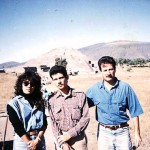“A friend of mine told me that some guy from the Cubanacán Corporation had work for qualified girls. I went to see him and came back disappointed. To work in tourism then you had to let the bosses fuck you up the ass or be the son of some big shot”.
Havana Babylonia or Prostitutes in Cuba (published too as “Jineteras”)
He finishes his social service in Cienfuegos and doesn’t find work as a journalist in Havana. Finally, they tell him he can go to Publicitaria Coral, in the Cubanacán Corporation of Tourism and Commerce, S.A., where he learns the art of publicity. He is sent to Mexico for an advanced course with the Secretary of Tourism of the Aztec country: his first trip outside Cuba, “which opened my eyes to the existence of other worlds, and I jumped in with both feet at discovering a reality: Cuba was not the perfect center, the lighthouse and guide of the universe, as they insisted on telling me there. We were just one more nation, like any other, with its light and its shadows”.

In Mexico, together with the Cuban publicist Alina Albuerne and the Mexican Advertising Manager who served us during the trip
Upon his return he begins to work at the Spanish recording company, Caribe Productions, the first to give widespread publicity to the many Cuban musicians who at that time were shining on the Cuban and international stages. His work there is illegal: he was not hired by the company created in Cuba to select those employees. “But I was earning $200 a month when the dollar sold for 135 Cuban pesos”; which meant 27,000 Cuban pesos, during the height of the Special Period, when the maximum monthly salary of a Cuban worker was around 400 Cuban pesos.
He still remembers the publicity industry as a disgusting realm, full of disloyal competition, dirty tricks, and envy of foreign success. “I saw beautiful people turn into monsters. Having dollars in a country where the national currency wasn’t worth anything was a privilege that people defended to the point of betraying their principles.” He knew that social classes existed thanks to the dollar, “and that was another shock: my father once told me that he had fought against Batista to give me a country where the son of a poor man such as myself would never again have to suffer, or see, social inequality.” But even worse: “I could see up close, face to face, the life of wealthy people who turned their backs on the poor, those same politicians who demanded sacrifices of the Cubans.” To discover this terrible double standard of the “historical leaders of the Revolution” made him open his eyes: “It was like they were spitting on the long history of revolutionary struggle, loyalty and sacrifice of my father and other members of my family.”